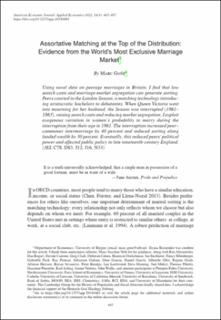| dc.contributor.author | Goni, Marc | |
| dc.date.accessioned | 2023-04-03T11:05:58Z | |
| dc.date.available | 2023-04-03T11:05:58Z | |
| dc.date.created | 2022-10-20T07:53:51Z | |
| dc.date.issued | 2022 | |
| dc.identifier.issn | 1945-7782 | |
| dc.identifier.uri | https://hdl.handle.net/11250/3061780 | |
| dc.description.abstract | Using novel data on peerage marriages in Britain, I find that low search costs and marriage-market segregation can generate sorting. Peers courted in the London Season, a matching technology introducing aristocratic bachelors to debutantes. When Queen Victoria went into mourning for her husband, the Season was interrupted (1861–1863), raising search costs and reducing market segregation. I exploit exogenous variation in women's probability to marry during the interruption from their age in 1861. The interruption increased peer-commoner intermarriage by 40 percent and reduced sorting along landed wealth by 30 percent. Eventually, this reduced peers' political power and affected public policy in late nineteenth-century England. | en_US |
| dc.language.iso | eng | en_US |
| dc.publisher | American Economic Association | en_US |
| dc.title | Assortative Matching at the Top of the Distribution: Evidence from the World’s Most Exclusive Marriage Market | en_US |
| dc.type | Journal article | en_US |
| dc.type | Peer reviewed | en_US |
| dc.description.version | publishedVersion | en_US |
| dc.rights.holder | Copyright 2022 American Economic Association | en_US |
| cristin.ispublished | true | |
| cristin.fulltext | postprint | |
| cristin.qualitycode | 2 | |
| dc.identifier.doi | 10.1257/app.20180463 | |
| dc.identifier.cristin | 2063011 | |
| dc.source.journal | American economic journal. Applied economics | en_US |
| dc.source.pagenumber | 445-487 | en_US |
| dc.identifier.citation | American economic journal. Applied economics. 2022, 14 (3), 445-487. | en_US |
| dc.source.volume | 14 | en_US |
| dc.source.issue | 3 | en_US |
